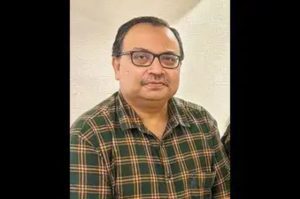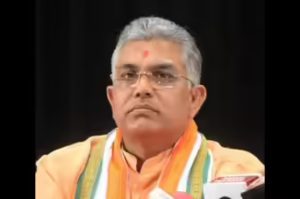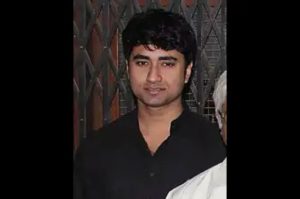Satire in Bengal Politics: Kolkata has long prided itself on being the cultural heart of India, a city where politics and art often intersect. That tradition came alive once again at Milan Mela ground, where actor and performer Anirban Bhattacharya and his band Hooliganism presented a biting satirical number aimed at three politicians from three different parties: Kunal Ghosh of the Trinamool Congress, Dilip Ghosh of the Bharatiya Janata Party, and Shatarup Ghosh of the Communist Party of India (Marxist).
The performance, marked by clever lyrics and sharp humour, quickly went viral on social media. Clips circulated widely, sparking debates not just about the targets of the satire but also about Bengal’s enduring relationship with political humor. Interestingly, all three politicians responded with a surprising openness, choosing laughter and acceptance over anger and defensiveness.
Satire in Bengal Politics: Politicians React with Maturity
The song poked fun at Kunal Ghosh’s alleged ties with promoters, lampooned Dilip Ghosh’s controversial remarks about gold being present in cow milk, and teased Shatarup Ghosh for his flashy SUV and regular television appearances.
- Kunal Ghosh took it sportingly, reportedly laughing at the caricature and brushing it off as harmless fun.

- Dilip Ghosh went a step further, pointing out that satire has always been a hallmark of a healthy democracy. He argued that humor, as long as it doesn’t cross into slander, is essential for freedom of speech.


- Shatarup Ghosh referenced the historical legacy of politically charged satire, noting that dissent and lampooning have always played crucial roles in democratic societies.


Their reactions stood in stark contrast to the hypersensitivity often displayed by political leaders elsewhere in India, where comedians and satirists have sometimes faced lawsuits, censorship, or even arrest.
A Rich Historical Lineage
Satire is not new to Bengal’s political culture. The state has a long and proud tradition of using wit as a tool for dissent, awareness, and social critique.
- In the early 20th century, Sarat Chandra Pandit, better known as Dada Thakur, became famous for his satirical magazine Bidushak, which lampooned colonial policies and local corruption. His biting commentary made him a household name, and his legacy is still celebrated today (West Bengal Heritage Commission).
- During the turbulent 1960s and 70s, theatre became a space for political satire. Utpal Dutt’s play Kallol (1965), which depicted the 1946 naval mutiny, was considered so politically sensitive that Dutt was arrested. His works showed how satire could challenge both social norms and government authority.
- In literature, authors like Satinath Bhaduri used parody and irony in novels such as Dhorai Charit Manas to expose the contradictions of politics and the hypocrisy of leaders.
This cultural history means that when satire reappears on Bengal’s stages or screens today, it is seen less as provocation and more as part of the state’s democratic fabric.
Satire in Modern Political Campaigns
While live performances like Bhattacharya’s draw crowds, satire has also migrated into digital formats. With traditional wall graffiti restricted under the Election Commission’s code of conduct, parties increasingly turn to memes, parody videos, and animated caricatures to lampoon their opponents.
- During the 2021 West Bengal Assembly elections, satirical social media campaigns were rampant, with animated videos mocking political leaders on both sides.
- The use of humor and parody in political advertising has become an accepted strategy, designed to make messages more shareable and less confrontational.
Scholars of political communication note that satire often travels faster and penetrates deeper than standard campaign speeches because it entertains while informing. Research from the Centre for the Study of Developing Societies (CSDS) highlights that young voters, in particular, respond more to satire than to conventional rhetoric.
The Role of Digital Platforms
The virality of the Milan Mela performance underscores the power of digital platforms in shaping political discourse. Social media has democratized satire, making it accessible not only from established actors or playwrights but also from ordinary citizens who create memes and spoofs from their phones.
The Internet Freedom Foundation (internetfreedom.in) has often stressed that protecting digital satire is crucial for safeguarding free expression online. As more political humor circulates on platforms like X, Facebook, and Instagram, the tolerance of political figures toward satire becomes a litmus test for democratic maturity.
Emotional and Cultural Significance
For Bengalis, humor is more than just laughter—it is cultural therapy. In a politically charged environment, satire provides a release valve for public frustration. It also serves as an indirect critique that feels less confrontational but is no less powerful.
Sociologists argue that this tradition reflects Bengal’s addā culture—the informal gathering where spirited debates, wit, and repartee flourish. Political satire naturally finds a home in such a culture, bridging entertainment and serious commentary.
Why the Netas’ Response Matters
The acceptance of satire by politicians in this case is a significant moment. It shows a willingness to laugh at oneself, which in turn builds public trust. In an era when humor is sometimes mistaken for disrespect, the reactions of Bengal’s leaders send a message: that democracy is strengthened, not weakened, by satire.
If political leaders encourage satire, they normalize critique and dialogue, which is essential for a participatory democracy. As the Law Commission of India has pointed out in its reports on freedom of speech, democratic resilience depends on the ability to tolerate—even embrace—mockery and dissent.
Looking Ahead
The Milan Mela satire may seem like a fleeting cultural moment, but it represents something larger: the revival of satire as a mainstream part of Bengal’s political theatre. If such performances continue to gain acceptance, they may encourage a new generation of artists, comedians, and playwrights to once again use their craft as tools of civic engagement.
It also challenges politicians to remain accountable. A society where leaders can laugh at themselves is one where citizens feel freer to question them.
External References for Readers
- West Bengal Heritage Commission – Preserving Bengal’s cultural and literary legacy
- Internet Freedom Foundation – Advocacy on digital free speech and satire
- Centre for the Study of Developing Societies (CSDS) – Research on democracy, politics, and communication
Also read: Home | Channel 6 Network – Latest News, Breaking Updates: Politics, Business, Tech & More

